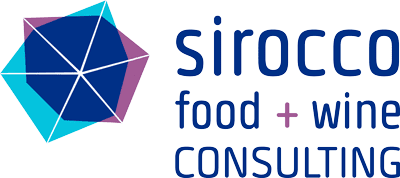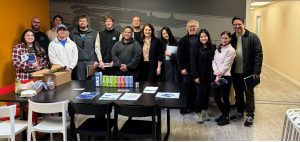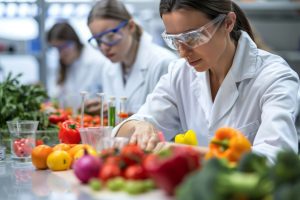Sirocco Food + Wine Consulting had the opportunity to organize a vertical sensory wine tasting at BC Winery Carter Wine Company and BC Wine Studio last month. The team was wrapping up harvest and getting ready for the Christmas season.
The 10-acre property is located in Okanagan Falls, a short drive from Penticton in the Okanagan Valley (British Columbia, Canada). Okanagan Falls is a sub-Geographical Indication for the Okanagan Valley, a terroir with noted typicity. Warm days and cool nights produce wines with ripe fruit character and acidity. The winery is run by a couple who is passionate about grape growing and winemaking. Stephen Carter, Proprietor, bought Hawk’s vineyard in 2011 with the hopes to cultivate his own land. Valérie Tremblay, Cellarmaster at BC Wine Studio and viticulturist, joined Carter Wines in 2017 and oversees 5 acres of old vines (13 varietals) which were planted in the 1980’s. Carter Wines’ approach to winemaking starts with the vineyard where the vines are farmed to achieve low yields, and minimal intervention, which leads to exceptional depth of flavour and varietal character in the wines. She also manages the operations at BC Wine Studio which offers private label services.
I have known Valérie for a few years, helping her and Stephen to obtain a few government food safety grants to better their operations. This time, we discussed collaborating on sensory evaluation to promote the winery. Valérie and Stephen wanted to celebrate the end of the harvest by inviting a few wine enthusiasts to a vertical tasting. They also wanted feedback on their wines. It was the ideal setting for me to introduce them to sensory science.
The tasting comprised 3 flights. We kicked things off with an award winning Ehrefelser/Riesling blend. 3 crisp and clean vintages were tasted which were very much liked. The 8 tasters then assessed 6 reds: 3 Lemberger / Merlot blends and 3 Cabernets.
The Pivot© Profile Test Method was chosen for the wine tasting. This is the method of choice to capture tasting notes from both experts and wine consumers. It is based on a series of paired comparison tests where individual samples are assessed against an average or “Pivot” sample (in this case, a mixture of all wines in equal proportion). Assessors are required to evaluate, using their own words, the sensory profiles of wines and compare them to the Pivot by identifying which perceptions are less or more intense than those of the pivot.
The 6 wines were tasted blind. The group of wine judges didn’t know the vintage or varietals they were tasting. The 3 cabernets were evaluated first, starting with the 2018 vintage and ending with the 2020 vintage. The 3 Lemberger/Merlots were tasted last (2017, 2019 and 2018). We used tasting sheets and later inputted the sensory information into a piece of software (Tastelweb®) to generate insights.
Sensory Insights – Carter Wines
The wines live up to their terroir. The grapes were picked while very ripe. The Okanagan valley is known for its very hot summer days (see Growing degree day report). The panel didn’t detect any vegetal, capsicum (green bell pepper) character or pronounced oxidation in any of the wines.
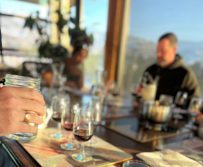 The wines displayed strong red and dark fruit character, tannins and some good use of oak. The winemaking team uses both French and American oak. American oak provides more perceived sweetness (vanilla notes) to the wines. French oak gives wine more spicy aromas. The feedback from the group (results from 6 tasters) was summarised in a lexical analysis. The following top descriptors were as follows: “Fruity/Red and dark fruit” (mentioned 17 times), Tannic (14), Oak aromas (11), Sweetness (10) and Spice (8, “cinnamon”, “tobacco”, “licorice”). Lastly, Cherry aroma was listed 7 times.
The wines displayed strong red and dark fruit character, tannins and some good use of oak. The winemaking team uses both French and American oak. American oak provides more perceived sweetness (vanilla notes) to the wines. French oak gives wine more spicy aromas. The feedback from the group (results from 6 tasters) was summarised in a lexical analysis. The following top descriptors were as follows: “Fruity/Red and dark fruit” (mentioned 17 times), Tannic (14), Oak aromas (11), Sweetness (10) and Spice (8, “cinnamon”, “tobacco”, “licorice”). Lastly, Cherry aroma was listed 7 times.
The oldest wine in the flight was a 2017 Lemberger/Merlot. The wine had a rich deep colour and was well liked by the group. It displayed strongest fruit/berry aromas, some good tannins and complexity from barrel ageing.
The sensory results also identified some insights about the integration of oak and the level of tannin extraction during winemaking. The selection of oak at the winery is made with guidance from Nuance Wine Supplies Inc, a well-known consulting and wine supply company in the valley.
The 2019 Lemberger/Merlot and 2018, 2019 Cabernets stood out in our analysis and were equally enjoyed by the panel. The 2019 Merlot blend was most oaky, the 2018 Merlot blend had the strongest sweet oak character and the 2018 Cabernet was most tannic. The 2019 Cabernet displayed good integration of oak due to its sweetness. One winemaker approved and thought that the fruity character was “enhanced from the use of oak” in this wine. The 2020 Cabernet appeared slightly more aged compared to the 2 earlier vintages. I noticed some savoury/bacon fat aromas, a descriptor I have often found in local aged Syrahs. Overall, the consensus was that the 3 Cabernets were very enjoyable and easy-drinking.
The sensory program generated sensory sheets for the wines. These sensory profiles may be used by the winery to develop tasting notes, to guide consumers during tastings and to compare wines.
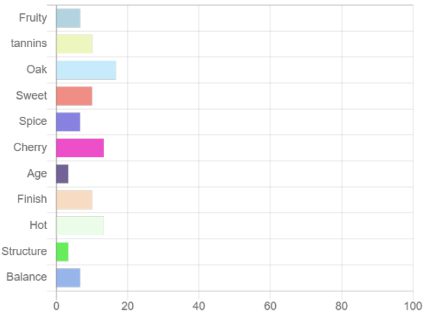
Source: Tastelweb®, Sensory Card for 2019 The Lemberger/Merlot (Hawk’s Vineyard), Carter Wine Company. The sensory card captures the top descriptors most often cited by the panel for this wine.
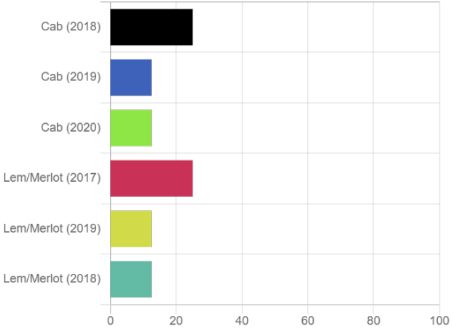
Source: Tastelweb®, Sensory Card for “Spice” descriptor, Carter Wine Company. The sensory card captures the spice character for the 6 wines assessed by the panel.
Interview with Valérie Tremblay, Winemaker at Carter Wine Company
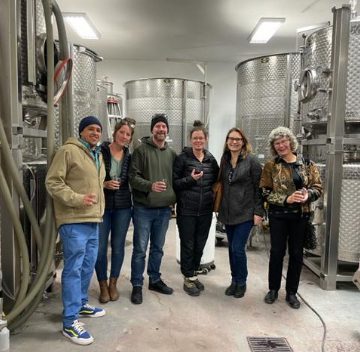 What did you think of the Pivot© test method?
What did you think of the Pivot© test method?
I loved the experience. The novices can be a little lost in the process because of the different tastes in the pivot wine. For the more advanced wine assessors, it gives us the opportunity to really taste and smell the wine aromas without expectation of what they are supposed to be. Getting out of the cellar and blind-tasting is, I believe, a must-do for us!
You read the sensory report. Will you be able to take action from the results of the sensory analysis?
The results of the report help me recognize what our terroir is. The fruit contributes a lot towards it. Getting the opinions of the participants and seeing the results of the analysis is really helping in strengthening the direction of the Carter brand.
Sirocco Food + Wine Consulting offers sensory training and consulting services. We represent Tastelweb® in Canada and the United States. Karine Lawrence has been a BC VQA assessor for 8 years. She holds a WSET Level 2 Certificate. In 2013, she completed her master’s degree practicum project (UBC-Vancouver) in collaboration with Laughing Stock Winery. Her wine research projects have been published in Consumer Science and Strategic Marketing: Case Studies in the Wine Industry (Woodhead Publishing, 2019).
